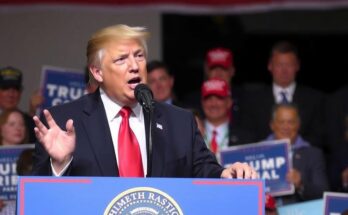As the 2024 presidential election approaches, foreign threats, especially from Russia, Iran, and China, are intensifying. Russia has ramped up disinformation campaigns targeting key candidates, while Iran has engaged in hacking efforts attempting to damage the Trump campaign. China continues its cyber operations but appears more neutral in the electoral landscape. U.S. officials are working proactively to expose these threats and ensure electoral integrity.
As the U.S. presidential election nears, foreign threats to electoral integrity have increased, prompting swift responses from officials. Recent accounts include a hacked phone of a presidential candidate and doctored videos of ballot destruction. Experts have noted intensified efforts by Russia, China, and Iran to interfere in U.S. politics. Intelligence officials confirmed that Russian state-controlled entities are particularly active, utilizing disinformation campaigns to undermine public trust in the electoral process. This includes spreading misleading content about key political figures such as Vice President Kamala Harris, whom Russia has targeted with false accusations and propaganda videos. Meanwhile, Iranian operatives have executed hacking campaigns aimed at damaging reputational narratives surrounding the Trump campaign. Furthermore, while China is regarded as relatively neutral, it has been implicated in extensive cyber-espionage aimed at individuals connected to both major parties. The U.S. government, learning from past election cycles, has adopted a more proactive stance in disclosing and combating foreign interference to reassure voters of the election’s security.
In contemporary political climates, foreign interference, especially from state actors, poses a significant risk to democratic elections. The U.S. election system has previously faced interference attempts that have tested its resilience. Following the revelations of past election cycles, particularly the impact of Russian interference in the 2016 election, increased awareness of the vulnerabilities of democratic processes has emerged. The patterns of disinformation, cyberespionage, and manipulative strategies designed to exploit societal divisions have become more prevalent, particularly as the nation heads into another critical electoral period. Understanding the nature of these threats and the motivations behind these actions is essential in framing the current electoral challenges.
In summary, the increasing prevalence of foreign electoral interference, particularly from Russia, Iran, and China, highlights the vulnerabilities of the U.S. electoral process. The utilization of disinformation campaigns and cyber activities reveals a concerted effort by adversarial nations to manipulate public opinion and undermine democratic institutions. As election day approaches, U.S. officials exhibit a more vigilant approach, actively addressing and exposing these threats to bolster public confidence in the electoral system.
Original Source: apnews.com




